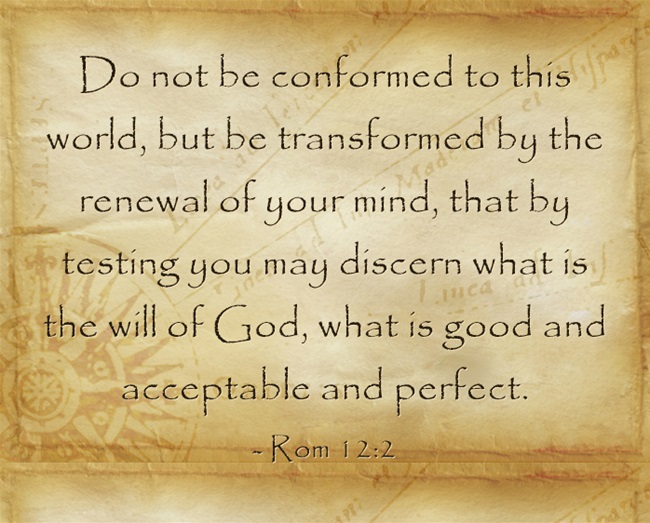Transformed By The Renewing Of Your Mind
Introduction
Believers are not to conform to the world. Instead, we are to be transformed into the likeness of Christ. This transformation is both decisive and continuous. As Christians, we no longer live our lives under the authority of the world (and its rebellion against God); instead, our goal is to become more and more like him who bought us from the world and called us out of the world so that we are no longer of the world even though we live in the world.
Beholding Christ, a prerequisite to transformation
How does this transformation from worldliness to Christ-likeness take place? Paul, in 2 Corinthians 3, did not leave us without a clue. The Israelites looked steadily into the face of Moses, but they could not keep looking because of the glory exuding from his face (Verse 13). Moses had to put a veil over his face. However, in the new covenant, we look into the face of Christ without a veil (verse 18) even though the glory that comes from the face of Christ surpasses the fading glory that came from the face of Moses (verses 7-11).
Paul’s point here is that it is by beholding the face of Christ and the glory therein that we become transformed into his likeness. There is no transformation apart from beholding. This is another reason why the change is continuous (from one degree of glory to another). Since the beholding is continuous and incremental, the transformation is also ongoing and progressive. In essence, the change from worldliness to Christ-likeness takes place through a constant beholding of the glory that comes from the face of Christ.
In essence, the change from worldliness to Christ-likeness takes place through a constant beholding of the glory that comes from the face of Christ. Share on X
The Light of the Knowledge of the Glory of God
What do we see in the face of Jesus Christ? 2 Corinthians 3:18 is clear that it is glory that we see in the face of Jesus Christ. However, Paul goes further in 4:6 to inform us that the glory we see in the face of Christ is the “light of the knowledge of the glory of God.” What is the glory of God? The glory of God is a display of his holiness (Isaiah 6:3, Leviticus 10:3), and God’s holiness is the foundation of his character. The glory of God is the display, the beauty, the manifestation of all of his holy perfections. God is love, and his love is holy. When God displays his holy love, that is the glory of God. God is just, and his justice is holy. When God demonstrates his holy justice, that is the glory of God. If we ask the question, “how do we know God, how do we discern his character, how do we gain an understanding of his will?” Paul tells us the answer is to look at the face of Christ. It is in Christ that we get the fullest and complete expression of who God is (Hebrews 1:1) – his being, perfections, and character. In Christ, we have the complete revelation of God and the full display of the glory of God.
The glory of God is a display of his holiness (Isaiah 6:3, Leviticus 10:3), and God's holiness is the foundation of his character. The glory of God is the display, the beauty, the manifestation of all of his holy perfections. Share on X God is love, and his love is holy. When God displays his holy love, that is the glory of God. God is just, and his justice is holy. When God demonstrates his holy justice, that is the glory of God Share on X
Therefore, to behold the face of Christ is to know God – his perfections, his character, his being, and his will.
To summarize, the transformation from worldliness to Christ-likeness takes place as we come to behold the glory of God (the display of his perfections, character, being, and will) in the face of Jesus Christ.

The Face of Christ and the Renewing of our Minds
Let us now return to Romans 12:2. Here Paul tells us that the transformation God calls us to occur with the renewing of our mind. It is when we renew our minds that we get transformation. A helpful parallel is in Ephesians 4:22-24. “You were taught, with regard to your former way of life, to put off your old self, which is being corrupted by its deceitful desires: to be made new in the attitude of your minds; and to put on the new self, created to be like God in true righteousness and holiness.”
Paul is essentially making the same point here. In these verses, there is also a transformation – from the old self to the new self and from the former way of life to righteousness and holiness. But what we are transformed into – righteousness and holiness- is essentially God-likeness (created to be like God). In Romans 12:1 and 2 Corinthians 3:18, the transformation is to Christ-likeness. In Ephesians 4:23, it is to God-likeness. Essentially, Ephesians 4:23 agrees with Romans 12:1 and 2 Corinthians 3:18 on the goal/destination of this transformation.

However, that is not all. In Ephesians 4:23, the transformation also begins with the mind- to be made new in the attitudes of your minds. It begins with a renewal that occurs in the attitudes (spirit- ESV, NASB) of the mind. Paul’s point here is that the transformation (old self-new self, the former way of life-God-likeness) takes place first with the renewing of our minds.
So to get back to Romans 12:2, the transformation (worldliness-Christ-likeness) starts with the renewing of the mind. The word for renewal (anakainosis) means a renovation, a complete change for the better (Thayer). The mind (nous) is the “faculty of perceiving and understanding and those of feeling, judging, determining.” (Thayer). The renewing of the mind is then a process whereby the way we feel, judge, and determine experiences a renovation or a complete change. The mind begins to experience a continuous change such that we start to feel, think, judge, adjudicate, discern, and decide differently than when we were of the world.
The renewing of the mind is then a process whereby the way we feel, judge, and determine, experiences a renovation or a complete change. Share on X The mind begins to experience a continuous change such that we start to feel, think, judge, adjudicate, discern, and decide differently than when we were of the world. Share on X
The Renewing of the Mind and the Will of God
One way to get a better grasp of what this renewing entail is to look at the result. Paul tells us that the result of this renewing of the mind is that we will be able to test and discern (approve) what the will of God is (ESV). This will of God is that which is good, acceptable, and perfect. In every situation, it is the will of God that is the good, acceptable, and perfect thing to do. The will of God is what is proper, pleasing, and perfect.
When we experience the renewing of our minds, we will be able to discern the will of God (which is what is good, acceptable, and perfect). Therefore, whatever this renewing of the mind consists; it leads to a greater discernment, understanding, and embracing of the will of God. When we know the will of God, we now feel, judge, think, adjudicate, discern, and decide based on the will of God.
To summarize, the renewing of our mind is a process, which leads us to feel, judge, think, adjudicate, discern, and decide everything based on the will of God. If we ask the question, “How do I know someone who is experiencing the renewing of the mind that Paul talks about in Romans and Ephesians?” The answer that Paul is getting at is, “the one who experiences the renewing of the mind first discerns the will of God in all situations and then decides all things, judges all things, adjudicate all things, thinks and feels about all things in harmony with and based on the will of God.” If you ask him what he thinks about anything, he consults with the will of God. If he has to make any decisions, his primary concern is to know and embrace the will of God. If he wants to discern between right and wrong, good and evil, it is the will of God that decides. His feeling about anything and everything flows out of his discernment and approval of the will of God.
[ bctt tweet= “the one who experiences the renewing of the mind first discerns the will of God in all situations and then decides all things, judges all things, adjudicate all things, thinks and feels about all things in harmony with and based on the will of God.”]
What then, is the renewing of the mind?
If this is the result of the renewing of the mind, what exactly is this renewing itself?
Pulling Romans 12:2, 2 Corinthians 3:18, and Ephesians 4:23 together, I believe the renewing of the mind is a process where we grow in our knowledge of God – his being, his character, and his perfections (the glory of God in 2 Corinthians 4:6). This growth in the knowledge of God takes place as we behold God’s revelation of himself, which culminates and finds its perfection and completeness in Christ (2 Corinthians 3:18 and 4:6). The more we behold Christ, the more we grow in the knowledge of the being, character, and the perfections of God. Such growth causes a renovation, a complete change in the spirit of our mind (Romans 12:2, Ephesians 4:23). The result of this is that we get to know and discern the will of God more and more. The more we discern the will of God, the more we test and approve it, which means we think, feel, judge, discern, decide anything and everything based on the will of God.
To put it in practical terms, as we spend more time in God’s word (where we see the revelation to the prophets and the complete revelation in Christ- Hebrews 1:1-2), we know him more and part of (and the result of) knowing him more is a greater familiarity with his will. As we grow in our knowledge of God and the discerning of his will through the scriptures, our minds experience a renewal – our thinking patterns change. Because this renewal takes place by the power of the Lord, who is the Spirit (2 Corinthians 3:18), it is not merely intellectual. Rather, it produces men and women who approve the will of God so that all their thinking, feeling, judging, deciding, adjudicating take place based on the will of God (which is good, acceptable, and perfect). In short, they have come to the place where they begin to love God with all their heart, soul, and mind. In theological parlance, when our minds are renewed, we begin to “think God’s thoughts after him.”
as we spend more time in God’s word (where we see the revelation to the prophets and the complete revelation in Christ- Hebrews 1:1-2), we know him more and part of (and the result of) knowing him more is a greater familiarity with his will. Share on X
How do all of these fit together? What is the connection between this and all we have discussed about the gospel-shaped life? In the next and last article in this series, we wrap it all up with summaries and some conclusions.
Because this renewal takes place by the power of the Lord, who is the Spirit (2 Corinthians 3:18), it is not merely intellectual. Rather, it produces men and women who approve the will of God. Share on X In theological parlance, when our minds are renewed, we begin to “think God’s thoughts after him. Share on X


